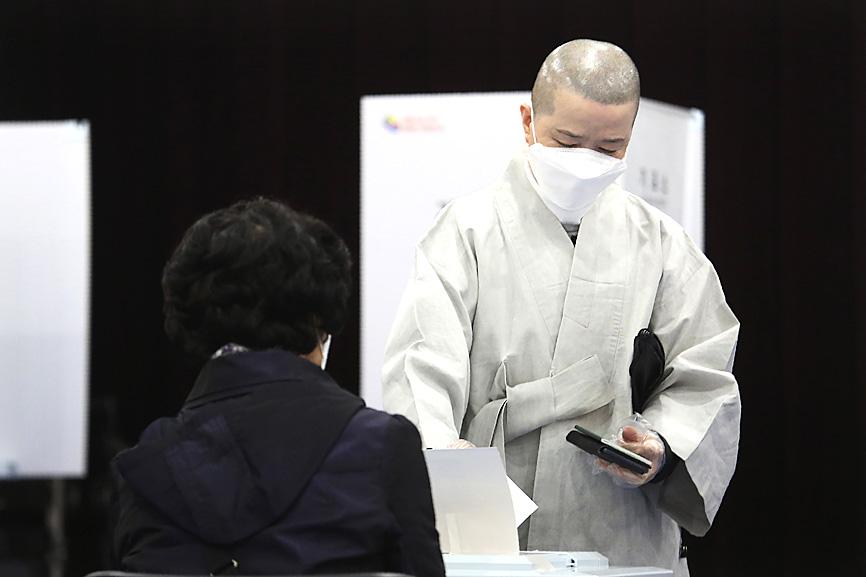South Korean President Moon Jae-in’s Democratic Party was headed for its worst defeat in five years in mayoral elections in South Korea’s two biggest cities, a troubling sign for his progressive bloc just 11 months ahead of a presidential vote.
Exit polling released after the close of voting yesterday showed conservative Oh Se-hoon, on pace to win in the race in Seoul over ruling party candidate Park Young-sun, a former minister for start-ups.
Oh led an exit poll with 59 percent to Park’s 37 percent, Korean Broadcasting System (KBS) reported.

Photo: AP
In Busan, Park Hyung-jun of the conservative People Power Party was also well ahead of Kim Young-choon from Moon’s ruling party, KBS said, citing a poll.
Final results were not expected until early today, but a key issue in the race was anger over housing prices in big cities, where prices have soared under Moon.
Losses in the cities that account for about one-quarter of South Korea’s population could slam the brakes on Moon’s agenda to increase public employment and a push for larger fiscal spending.
It would also serve as warning to his Democratic Party that it needs to revamp its policies if it wants to keep the presidency when Moon’s single, five-year term ends next year.
If the polling numbers hold up, it would mean a stunning reversal for Moon and his allies.
They won a supermajority in parliamentary elections about one year ago, riding a wave of public support for their management of the COVID-19 crisis.
Moon’s party has scored a series of victories in the wake of the 2016 impeachment of former South Korean president Park Geun-hye, a conservative leader later convicted of corruption.
Amid the anger over housing and stumbles in virus management, Moon’s support rating hit a new low last week, following allegations that employees of a state-run land corporation used insider information to make money for themselves from housing developments in Seoul.
The scandal was the latest in a series of questionable land deals that have dogged the Moon presidency.
Oh, backed by the People Power Party, has been hammering Moon’s government for tightening regulations on redevelopment and limiting the number of building permits over the years, saying that the attempt to rein in gains by private constructors has backfired.
Oh resigned as Seoul mayor in 2011 having lost a fight to curb free student lunches in the capital to reduce public spending, stoking criticism of being tight-fisted.
A return to power could signal that public sentiment has soured toward Moon’s economic policies that prioritize wealth redistribution and fiscal aid.

ROLLER-COASTER RIDE: More than five earthquakes ranging from magnitude 4.4 to 5.5 on the Richter scale shook eastern Taiwan in rapid succession yesterday afternoon Back-to-back weather fronts are forecast to hit Taiwan this week, resulting in rain across the nation in the coming days, the Central Weather Administration said yesterday, as it also warned residents in mountainous regions to be wary of landslides and rockfalls. As the first front approached, sporadic rainfall began in central and northern parts of Taiwan yesterday, the agency said, adding that rain is forecast to intensify in those regions today, while brief showers would also affect other parts of the nation. A second weather system is forecast to arrive on Thursday, bringing additional rain to the whole nation until Sunday, it

LANDSLIDES POSSIBLE: The agency advised the public to avoid visiting mountainous regions due to more expected aftershocks and rainfall from a series of weather fronts A series of earthquakes over the past few days were likely aftershocks of the April 3 earthquake in Hualien County, with further aftershocks to be expected for up to a year, the Central Weather Administration (CWA) said yesterday. Based on the nation’s experience after the quake on Sept. 21, 1999, more aftershocks are possible over the next six months to a year, the agency said. A total of 103 earthquakes of magnitude 4 on the local magnitude scale or higher hit Hualien County from 5:08pm on Monday to 10:27am yesterday, with 27 of them exceeding magnitude 5. They included two, of magnitude

CONDITIONAL: The PRC imposes secret requirements that the funding it provides cannot be spent in states with diplomatic relations with Taiwan, Emma Reilly said China has been bribing UN officials to obtain “special benefits” and to block funding from countries that have diplomatic ties with Taiwan, a former UN employee told the British House of Commons on Tuesday. At a House of Commons Foreign Affairs Committee hearing into “international relations within the multilateral system,” former Office of the UN High Commissioner for Human Rights (OHCHR) employee Emma Reilly said in a written statement that “Beijing paid bribes to the two successive Presidents of the [UN] General Assembly” during the two-year negotiation of the Sustainable Development Goals. Another way China exercises influence within the UN Secretariat is

Taiwan’s first drag queen to compete on the internationally acclaimed RuPaul’s Drag Race, Nymphia Wind (妮妃雅), was on Friday crowned the “Next Drag Superstar.” Dressed in a sparkling banana dress, Nymphia Wind swept onto the stage for the final, and stole the show. “Taiwan this is for you,” she said right after show host RuPaul announced her as the winner. “To those who feel like they don’t belong, just remember to live fearlessly and to live their truth,” she said on stage. One of the frontrunners for the past 15 episodes, the 28-year-old breezed through to the final after weeks of showcasing her unique